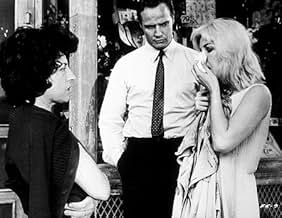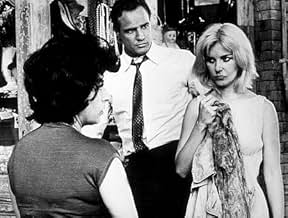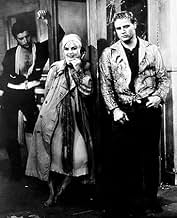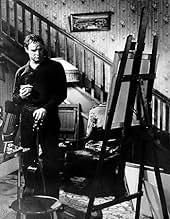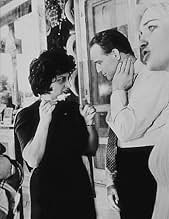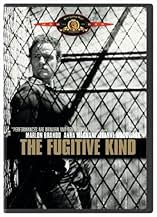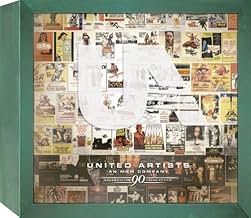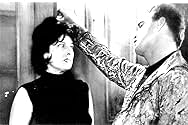Valentine "Pelle di serpente" Xavier, un vagabondo incline ai guai che cerca di rigare dritto, giunge in una piccola città del Mississippi cercando una vita semplice ma rimanendo imbrigliato... Leggi tuttoValentine "Pelle di serpente" Xavier, un vagabondo incline ai guai che cerca di rigare dritto, giunge in una piccola città del Mississippi cercando una vita semplice ma rimanendo imbrigliato in una relazione con una donna problematica.Valentine "Pelle di serpente" Xavier, un vagabondo incline ai guai che cerca di rigare dritto, giunge in una piccola città del Mississippi cercando una vita semplice ma rimanendo imbrigliato in una relazione con una donna problematica.
- Regia
- Sceneggiatura
- Star
- Premi
- 2 vittorie totali
- Ruby Lightfoot
- (as Spivy)
- Bit Part
- (non citato nei titoli originali)
Recensioni in evidenza
Written in 1957, "Orpheus Descending" is a reconstruction of Williams' 1940 "Battle of Angels," filmed under Sidney Lumet's direction as "The Fugitive Kind."
Williams subtracted elements of the ancient myth of Orpheus and Euridice to examine the sadistically patriarchal Southern Gothic town and to create a violent plot, involving ruined love, weakness, sex, betrayal, vengeance and lingering hatreds... "Orpheus Descending" shows how social prejudice threatens the lives of identified outsiders...
This classic play is not quite his masterpiece... "A Streetcar Named Desire" is... It lacks some of the regretful charm of "The Glass Menagerie" and the entire impact of "Cat On a Hot Tin Roof." Nevertheless it is a deeply moving work of art...
Williams was known for his compelling dialog and themes that - for their time - often seemed strange or shocking... He vividly suggested the sexual tensions and prevented violence of his tormented character, usually with compassion as well as irony...
The film focuses on a handsome drifter from New Orleans, named Val Xavier, wearing a snake skin jacket - Williams' trademark of a rebel, non-conformist - Val is a "fugitive kind" who comes in off the highway... He is a rural Orpheus who descends to rescue his love, not in Hades precisely, but among the intrigue, chatter, and violence of the hot-tempered town of Two Rivers, Mississippi... He is a wandering guitar player who embarks on an affair with a lonely frustrated unhappy storekeeper's wife Lady Torrance...
Anna Magnani is intelligently sensual and charming as Lady... Joanne Woodward is the hungry grotesque drunken Carol who tries to seduce Val in a cemetery... Both women are so intense, that they force you to become involved with them...
The genuine community provides also interesting watching: Victor Jory, positively magnetic as the brutal oppressive husband Jabe Torrence; the vindictive sheriff R. G. Armstrong; and the soft-hearted Vee (Maureen Stapleton).
Lady Torrence is a study of the immigrant woman who has acquired a patina of resilient toughness but who slowly admits her sensuality... She catches perfectly contradictory emotions of one who is wary of the stranger but who longs for his healing touch...
With handsome magnetism, Brando is no less compelling... He is quite convincing avoiding all the clichés of the drifting Don Juan... With some kind of lucid intensity, he mixes his character's predatory and uncivil arrogance with flashes of sweet tenderness...
The film (definitely worth seeing) is extremely poignant and captivating... The direction is excellent and the action moves very smoothly, never allowing you to relax...
This was Brando's second time doing Williams for the screen, the first time being A Streetcar Named Desire. Curiously enough this was Anna Magnani's second time doing Tennessee Williams for the screen as well, she won an Oscar in 1955 for The Rose Tattoo. So the combination of Brando and Magnani seemed a natural for the screen. I don't think The Fugitive Kind is as good as Streetcar or The Rose Tattoo, but the parts are meaty enough roles for both these honored players.
Characters seem to drift in to The Fugitive Kind from other Williams work. Brando's Val Xavier is quite like Chance Wayne in Sweet Bird of Youth, in fact in the review's title is the illusion Brando himself makes of his character. He's an early 30 something drifter with a talent for sex and music, the former probably more than the latter.
Unlike Chance, Xavier doesn't have a female keeper, but he'd like to find one. He passes up liaison with the town trollop played by a third Oscar winner in the cast, Joanne Woodward for the older and married Anna Magnani.
Magnani is trapped in a loveless marriage to a dying Victor Jory, a petty tyrant who runs the town general store. Like Big Daddy in Cat on a Hot Tin Roof, Jory is dying of cancer at a much more advanced stage of the disease than Burl Ives had. Picture Big Mama from that play hot to trot for Chance Wayne and you've got the essence of The Fugitive Kind.
Joanne Woodward has an interesting part. Part of her loose behavior is in rebellion against the time honored tradition of institutional racism that is the south that Tennessee Williams grew up in. I'm not an expert on Tennessee Williams, but of the works I've seen that are revived frequently, this is the only one where Williams directly brings up racism.
Orpheus Descending on Broadway only ran 68 performances in 1957. Two members from the Broadway cast made it to the screen, R.G. Armstrong as the sheriff repeating his role and Maureen Stapleton who had Joanne Woodward's part on stage, essays the part of the sheriff's wife who also is married to another middle aged tyrant. Considered a lesser work of Williams at first, Orpheus Descending is now revived frequently by stock theater companies everywhere. A critically acclaimed revival on Broadway in 1989 with Vanessa Redgrave and Tammy Grimes and Kevin Anderson helped bring Orpheus Descending into its proper place in the sun.
Maybe if a remake is ever done, it will even be done under its proper original title. Till then we can be well satisfied with this version.
This is one of those great movies that slips its way into that big gap between the great Hollywood Golden Age to the great New Hollywood of the late 1960s. An awful lot of films from the period between (1955-65) are weak or even downright bad, big budgets and all. The Hollywood gems in that time are usually a little gut wrenching, and many are based on plays, or push political issues (I'm thinking of "The Apartment" and "The Manchurian Candidate"). The famous directors coming to their own during time include Elia Kazan and Robert Wise, and of course Sidney Lumet, who directed this one.
This is all working class, plainspeaking, emotive material. Right from the get-go with leading man Marlon Brando doing a long take as he stands before a judge, we are filled with heart-wrenching stuff, people who want to be something and don't know how, or people with big hearts that are broken or dirty. The cast, beyond Brando, is terrific: Joanne Woodward as a young floozy with a sharp sense of independence, Maureen Stapleton as a simple and faith filled wife of the sheriff, and Anna Magnani, intense and troubled but superior in her own out of place way.
There are powerful displays of white narrow-mindedness (call it bigotry, but it is largely aimed at just anyone they don't like) that don't quite fall into clichés, there is love that shouldn't be and that never is, there is old world morality and inbred local gossipy immorality. Things are bound for collision even by twenty minutes in, and there are innuendoes and hidden histories waiting to blossom.
Lumet has a knack for the serious, with his 1957 breakthrough film "12 Angry Men" a template for his career. As lively and even crazy as this movie is, it's also probing deeply into human woe and maladjustment (often deliberate). The core of the writing belongs to Tennessee Williams, who of course is all about inner troubles and outward misunderstood or mistaken actions. There is nothing superficial here, not in the acting, the filming, or the scenes (set in the South but filmed near Saratoga Springs, New York). And if the wet, dark nights scenes and interiors with people quarreling and fighting aren't enough to suck you in, the story, about wanting to live, nothing more, is beautiful and important. All four of the main characters are deeply good people, and all flawed in small but debilitating ways.
Which should sound familiar. As over the top as it sometimes seems, you'll identify with the position some of the people end up in. Brando is temperamental but patient and with a profound sense of justice. Woodward is a free spirit misunderstood (and punished) by the uptight and hypocritical society around her. The themes are frank for 1960, including an implication of a male so manly and irresistible the women want him (and get him) even when it's completely wrong. And when it's right. The sexuality, partly pumped up by the writing of the openly gay playwright (Williams), is all over Brando's face and in his scenes. And this is his movie.
High high drama, but from within. And explosive. Don't miss it.
Lo sapevi?
- QuizMarlon Brando described Anna Magnani as being equally fiery and passionate off screen. He claimed she made a pass at him in a hotel before filming began.
- BlooperAt the cemetery, Xavier returns to the car and turns on its headlights. A much brighter studio light comes on a beat too late to further illuminate the right side of the frame.
- Citazioni
Lady Torrance: Tell me some more about your self-control.
Valentine Xavier: Well, they say that a woman can burn a man down, you know? But I can burn a woman down. I'm saying that I could. I'm not saying I would.
Lady Torrance: What's the matter? Have they tired you out?
Valentine Xavier: No, I'm not tired.
I più visti
- How long is The Fugitive Kind?Powered by Alexa
Dettagli
- Data di uscita
- Paese di origine
- Lingua
- Celebre anche come
- El hombre de la piel de víbora
- Luoghi delle riprese
- Azienda produttrice
- Vedi altri crediti dell’azienda su IMDbPro
Botteghino
- Budget
- 2.000.000 USD (previsto)
- Tempo di esecuzione1 ora 59 minuti
- Colore
- Proporzioni
- 1.66 : 1


